
“Be a great painter, Asher Lev. It is the only justification for all the pain you are about to cause.”
Chaim Potok’s acclaimed 1972 novel My Name Is Asher Lev has now been transformed into a powerfully performed, deeply moving showcase for three of L.A.’s finest acting talents and one of our best directors at the award-winning Fountain Theater.
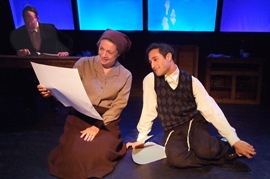 Playwright/adapter Aaron Posner has somehow, miraculously, managed to compact Potok’s 350-page novel into a play running a brisk hour and three-quarters, a gripping drama narrated by a 20something Asher, whose skyrocket to fame has indeed caused great pain, both to himself and to those whose love he cherishes, or so we will soon find out.
Playwright/adapter Aaron Posner has somehow, miraculously, managed to compact Potok’s 350-page novel into a play running a brisk hour and three-quarters, a gripping drama narrated by a 20something Asher, whose skyrocket to fame has indeed caused great pain, both to himself and to those whose love he cherishes, or so we will soon find out.
A series of flashbacks take us back to Asher as a child (Jason Karasev, astonishing as primary schooler, adolescent, and young adult), whose drawings have already begun to cause his parents Aryeh and Rivkeh (Joel Polis and Anna Khaja, brilliant as these and all other supporting characters) more than enough consternation and confusion.
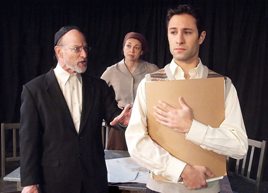 The Levs are, you see, Hasidic Jews living in Crown Heights, Brooklyn in the early 1950s, and the sketches he has so meticulously copied are of Jesus and naked women, not side-by-side thank Ribbono Shel Oylom, though it’s open to question whether Aryeh and Rivkeh would be any less upset if they were. “Do you know what has been done to us for 2000 years in the name of That Man!” cries Asher’s father. “And naked women? No Torah Jew would think of drawing such things.”
The Levs are, you see, Hasidic Jews living in Crown Heights, Brooklyn in the early 1950s, and the sketches he has so meticulously copied are of Jesus and naked women, not side-by-side thank Ribbono Shel Oylom, though it’s open to question whether Aryeh and Rivkeh would be any less upset if they were. “Do you know what has been done to us for 2000 years in the name of That Man!” cries Asher’s father. “And naked women? No Torah Jew would think of drawing such things.”
Clearly, there’s no way any twelve-year-old could make such tradition-bound parents understand the will that “makes me want to draw” regardless of the consequences, let alone why crucifixions and nudes are “part of a long and rich tradition,” and therein lies Asher’s dilemma.
A flashback to Asher at age six reveals a child who has already figured out on his own how a bit of smearing can make snow appear real and how cigarette ashes can be used to make a shape seem “less flatter” … only to have his father call his paintings nariskeit, foolishness, if not downright sacrilegious. In fact, were it not for Asher’s Uncle Yitzchok, no one in his family would have even the slightest idea of the budding Chagall in their midst.
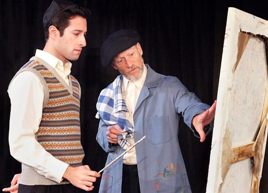 Fortunately for Asher, there is one other adult with the wisdom to recognize the boy’s talents and that is the Ladover Rebbe, the leader of the Levs’ Hasidic sect, who arranges for Asher to study under the renowned Jewish sculptor Jacob Kahn, who then introduces Asher to Manhattan gallery owner Anna Schaeffer—and the rest, as they say, is history.
Fortunately for Asher, there is one other adult with the wisdom to recognize the boy’s talents and that is the Ladover Rebbe, the leader of the Levs’ Hasidic sect, who arranges for Asher to study under the renowned Jewish sculptor Jacob Kahn, who then introduces Asher to Manhattan gallery owner Anna Schaeffer—and the rest, as they say, is history.
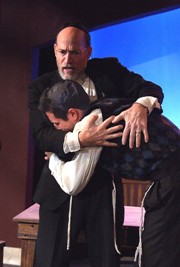 I can’t think of another play that has provided so rich and powerful a depiction of an artist’s compulsion to create, even if it means going against the religion whose traditions, customs, and precepts he holds dear, even if it means causing pain to those whose love he most cherishes.
I can’t think of another play that has provided so rich and powerful a depiction of an artist’s compulsion to create, even if it means going against the religion whose traditions, customs, and precepts he holds dear, even if it means causing pain to those whose love he most cherishes.
Not only is My Name Is Asher Lev potent, thought-provoking stuff, it is also as compelling a piece of theater as you’re likely to see any time soon, brilliantly directed by Stephen Sachs (the matching opening and closing tableaux are entirely Sachs’ inspiration) and featuring a trio of performances that ought to be on any theatergoer’s Best Of The Year list.
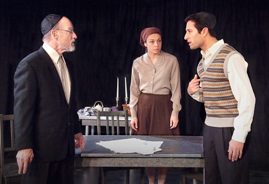 Polis aces the plum assignment of bringing to life four very different characters, beginning with Asher’s stern, judgmental, yet undeniably loving father, whom the accomplished stage-and-screen vet gives us in both vigorous middle age and weakened older years. Polis’s zesty Yitzchok, multilayered Rebbe, and bon vivant Jacob are splendidly realized creations as well.
Polis aces the plum assignment of bringing to life four very different characters, beginning with Asher’s stern, judgmental, yet undeniably loving father, whom the accomplished stage-and-screen vet gives us in both vigorous middle age and weakened older years. Polis’s zesty Yitzchok, multilayered Rebbe, and bon vivant Jacob are splendidly realized creations as well.
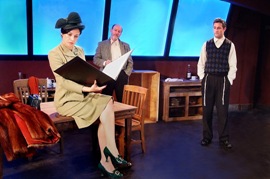 Khaja is equally superb as the complex bundle of contradictions that is Asher’s mother Rivkeh, whose heart-wrenching reaction to the sudden death of a beloved family member Khaja delivers quite stunningly. The glamorous, sophisticated Anna Schaeffer reveals the L.A. theater star’s versatility, while a brief cameo as model Rachel gives us Khaja in saucier mode, all of the above adding up to yet another award-worthy performance from the creator of Shaheed.
Khaja is equally superb as the complex bundle of contradictions that is Asher’s mother Rivkeh, whose heart-wrenching reaction to the sudden death of a beloved family member Khaja delivers quite stunningly. The glamorous, sophisticated Anna Schaeffer reveals the L.A. theater star’s versatility, while a brief cameo as model Rachel gives us Khaja in saucier mode, all of the above adding up to yet another award-worthy performance from the creator of Shaheed.
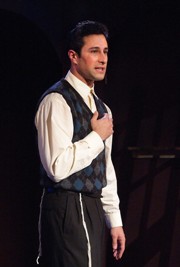 Finally, there would be no Asher Lev without the gifted young actor who brings Potok’s creation so richly and fully to life on the Fountain stage. As Asher the child, Karasev captures all the wonder and confusion and passion of an artist awakening to his gifts. Later, as our young narrator reaches adolescence and young adulthood, Karassev makes palpable the depth of Asher’s torment at seeing his art in such agonizing conflict with family and faith. Simply put, this is a performance you’ll be talking about for months to come.
Finally, there would be no Asher Lev without the gifted young actor who brings Potok’s creation so richly and fully to life on the Fountain stage. As Asher the child, Karasev captures all the wonder and confusion and passion of an artist awakening to his gifts. Later, as our young narrator reaches adolescence and young adulthood, Karassev makes palpable the depth of Asher’s torment at seeing his art in such agonizing conflict with family and faith. Simply put, this is a performance you’ll be talking about for months to come.
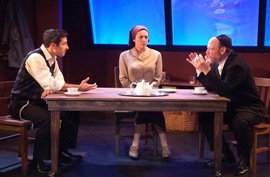 Scenic designer Jeff McLaughlin’s versatile, expansive set, dominated by a panel of artist’s studio windows, takes us smoothly from locale to locale, and is stunningly lit by the young lighting design master Ric Zimmerman. Costume designer Shon LeBlanc gives us just-right outfits for each character, his creations aiding Polis and Khaja in distinguishing between their many characters. Misty Carlisle’s props and Diane Martinous’s wigs are terrific too, with sound designer Lindsay Jones’ mood-enhancing original music and incisive effects equally invaluable to the production. Finally, kudos to dialect coach Tyler Seiple’s attention to the cast’s Brooklynese and Yiddish.
Scenic designer Jeff McLaughlin’s versatile, expansive set, dominated by a panel of artist’s studio windows, takes us smoothly from locale to locale, and is stunningly lit by the young lighting design master Ric Zimmerman. Costume designer Shon LeBlanc gives us just-right outfits for each character, his creations aiding Polis and Khaja in distinguishing between their many characters. Misty Carlisle’s props and Diane Martinous’s wigs are terrific too, with sound designer Lindsay Jones’ mood-enhancing original music and incisive effects equally invaluable to the production. Finally, kudos to dialect coach Tyler Seiple’s attention to the cast’s Brooklynese and Yiddish.
My Name Is Asher Lev is produced by Simon Levy and Deborah Lawlor. Terri Roberts is production stage manager and Scott Tuomey technical director.
My Name Is Asher Lev caps a phenomenal twelve months for the Fountain. On The Spectrum, Heart Song, The Normal Heart, and now this latest Fountain gem. Is there a finer 99-seat theater in all of Los Angeles? Check out the Fountain’s latest and see for yourself.
The Fountain Theatre, 5060 Fountain Ave., Los Angeles.
www.FountainTheatre.com
–Steven Stanley
February 27, 2014
Photos: Ed Krieger
Tags: Chaim Potok, Fountain Theatre, Los Angeles Theater Review, My Name Is Asher Lev


 Since 2007, Steven Stanley's StageSceneLA.com has spotlighted the best in Southern California theater via reviews, interviews, and its annual StageSceneLA Scenies.
Since 2007, Steven Stanley's StageSceneLA.com has spotlighted the best in Southern California theater via reviews, interviews, and its annual StageSceneLA Scenies.







 COPYRIGHT 2025 STEVEN STANLEY :: DESIGN BY
COPYRIGHT 2025 STEVEN STANLEY :: DESIGN BY